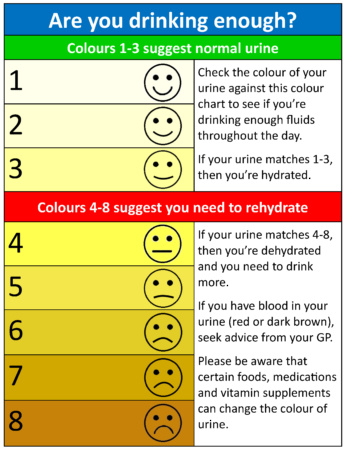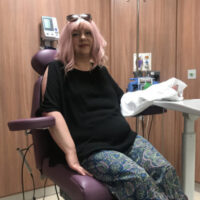Let’s Talk About Pee, Shall We?

Awareness plays a huge part in my life now, ever since I received the terminal diagnosis with small cell bladder cancer. It’s something I’m passionate about and it gives me a sense of purpose, which is (to be quite blunt) especially useful considering I’m supposed to be dead right now.
So, pee… Urine can be a good diagnostic tool for investigating how hydrated you are or if you have an infection.
Your pee is meant to be a pale yellow, straw-like colour. Anything between that and a soft yellow colour is considered ‘normal’ and you could consider yourself hydrated and well.
If your pee is a brighter yellow than that, then you need to drink more. Ideally, we are aiming for 1.2 - 2 litres a day (unless you have been medically advised otherwise) but this should be adjusted for your size, any exercise you do or how much you sweat. This amount could be considerably different for you if you have to restrict your fluid intake due to heart failure, high ileostomy output or another health reason.
If the colour is anything other than yellow, then there may be a problem. If an issue persists after you’ve tried drinking more, then it’s likely something more than dehydration and you should see your doctor.
If when you pee, you notice it’s foaming or full of bubbles this could mean you have excess protein in your diet and is usually nothing to worry about. However if it continues then please also go and see your doctor. Bubbles can also occur if you’re urine is concentrated from lack of hydration or during pregnancy.
If you notice a pinkish-red colour, this could indicate that blood is present and you do need to go and get that checked out urgently as it could be an infection or, in some cases, it could be bladder cancer. Ladies take note – it is of course normal to see this colour during menstruation.
Bladder cancer is very sneaky, you don't always notice all the symptoms until after you have been diagnosed.
I was extremely exhausted, but had attributed this to my new job, although it was only an extra two hours a day. The fatigue was so bad that by early evening I was struggling to form a sentence and can honestly say that I have NEVER felt that exhausted - even when I had my son!
Some bladder cancer symptoms can mimic a urinary tract infection (UTI) and there is also condition called ‘nocturia’ where you wake up multiple times in the night to pee. Nocturia can be caused by a high fluid intake but if you know this isn't the cause, then make a note of how many times you wake up to pee and keep a ‘fluid diary’ to record what you’re drinking/when and what the effect is during the day.
It’s important to record what’s going on with your pee because accurate information is better than just being a general about it – you may notice that your doctor will take you more seriously too.
As we get older we do tend to wake up and pee more in the evening. Alcohol can also wake us up. Or, perhaps you may have inflammation in your bladder. By keeping a diary you’ll be able to see if there’s a pattern and will have lots of information for your doctor, who should refer you to urology if they suspect you need more thorough investigations.
UTIs can make you feel exhausted, and you may feel a strong urge to pee but sometimes you may not be able to go once you get to the toilet. You might experience a burning sensation or pain when you pee and perhaps there is also a bad smell (when I say bad, I mean really bad). UTIs can be treated by your GP so always seek medical advice if you are concerned.
Never ignore the symptoms of a UTI because the infection can travel up to your kidneys and make you feel a whole lot worse.
Some UTIs can cause more serious symptoms like blood in your pee, pain in your lower back, extreme exhaustion etc. but these are also symptoms of bladder cancer so I cannot stress to you enough, that if something doesn’t feel ‘right’ you must seek help. I know my body, just as you will know yours and if there is anything you don't think is normal then I urge you to go to your doctor and actually ask, “Could this be bladder cancer?”
Don't be afraid to get a second or third opinion, doctors do make mistakes and women are more likely to be misdiagnosed.
I was told by my doctor that 10% of women will have blood in their urine at any time - when I told this to my urologist he was horrified. So if you have a urine test that returns ‘traces of blood’, and continue to feel unwell, do keep on going back to your doctor until you’re satisfied that you’ve found the cause and are being treated correctly. Ask to be referred to a urologist, these are the people who know all about pee.
Research now seems to suggest that those who have problems with their kidneys and bladder, in the form of UTIs, kidney or bladder stones, are at a higher risk of being diagnosed with bladder cancer.
Keep an eye on your pee and always look before you flush to check how hydrated you are or if there’s a possible infection.
Keep on checking that pee! You will be amazed at what it can tell you …. and it may well save your life!
*Urine colour chart sourced from NHS Infection Prevention and Control https://www.infectionpreventioncontrol.co.uk/resources/uti-are-you-drinking-enough/ [accessed 23/5/19].
“Awareness plays a huge part in my life now, ever since I received the terminal diagnosis with small cell bladder cancer.” - @big_british
Share this article:
by Anita Brown



About the author
Hi I’m Anita Brown. Diagnosed with terminal small cell bladder cancer in April 2016. I've had palliative chemo and radiotherapy, and a radical cystectomy and urostomy in August 2017.
I've had problems with my bladder all my life, from incontinence, to kidney and bladder stones, and now cancer. I would like to share some of my experiences - follow me on Twitter.



